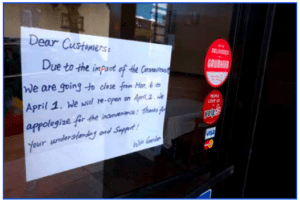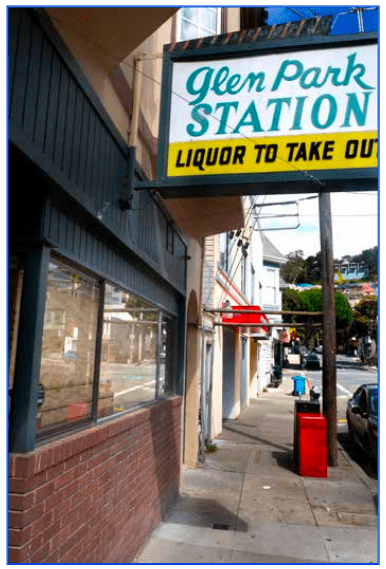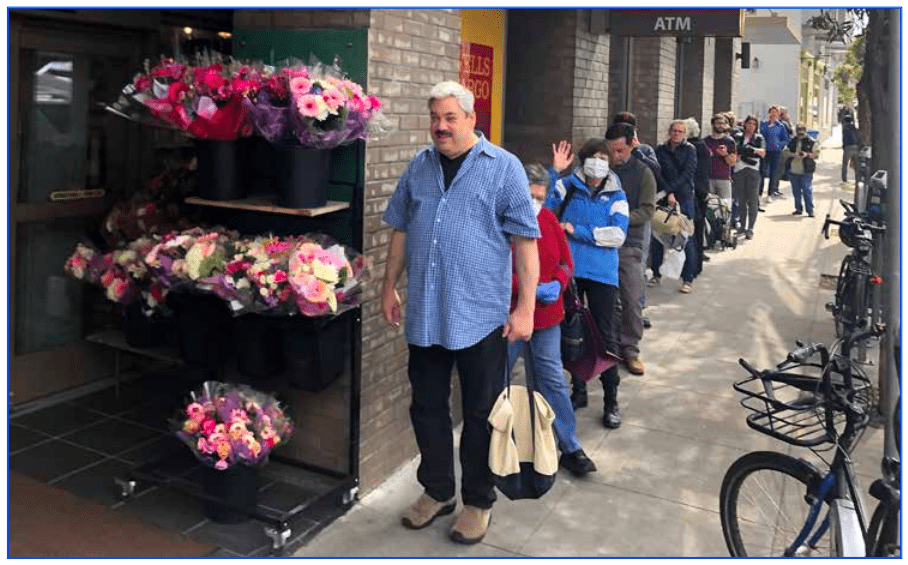Dear Readers,
This story is from the front page of the Spring 2020 Glen Park News. Due to COVID-19, there will not be a printed edition of the Spring 2020 News. We will be highlighting articles from the paper over the coming weeks, and you can read the full paper online here.
-Glen Park News Editors
When the Bay Area went into COVID-19 lockdown on March 17, downtown Glen Park, for the most part, shut its doors, too.
No streams of commuters pouring out of the BART station. No clumps of St. John school kids in their slightly disheveled uniforms heading to Cuppa for frozen yogurt and bubble tea. No solitary techies with laptops setting up office at Bello. No families grabbing a table at Gialina’s for pizza night. No one getting a mani-pedi at any of the salons on Diamond Street or a haircut at any salon.

Photo by Liz Mangelsdorf.
No seniors lingering and chatting over muffins and coffee at Destination Bakery, or over tuna sandwiches or pancakes at Tyger’s. No gym regulars working out at FitGlenFit. No jazz aficionados assembling for live concerts at Bird & Beckett. No baseball on the diamond in Glen Canyon Park, and nobody on the climbing wall in the Rec Center. No noise on the playgrounds at Big Blue or Dolores Huerta Elementary. No toddlers and their accompanying adults assembling for story hour at the library. No steady hum of traffic coming from Highway 280.
And no Glen Park Festival on April 26. The organizers emailed in mid-March: “We have decided to postpone this April’s festival in the best interest of our community, attendees, supporters and general public health. We do hope to still host a 2020 festival later in the summer. We will announce a new date as soon as one has been set.” They requested that sponsors and vendors keep pledges, contributions and reservations in place for the to-be-rescheduled street fair.
Now just a few doors are open at neighborhood businesses: Canyon Market and the two corner mom-and pop stores on Diamond Street—Buddies at Chenery and Glen Park Delicatessen at Bosworth—provide groceries and snacks. Glen Park Hardware, Glen Park Cleaners and Critter Fritters are considered “essential” businesses under the City’s shelter-in-place regulations. The Dignity Health-GoHealth Urgent Care facility across from the BART station is open to handle non-coronavirus-related medical needs.
But the near-empty sidewalks and empty parking places along Chenery and Diamond streets highlight a neighborhood under siege by a disease.
Probably most of us have been stunned by the rapid transition of the epidemic from a few isolated hotspots to an all-consuming pandemic that has changed the lives of most people on Earth. As the reality of the dangers of COVID-19 became clear, suggestions became policy, which in turn became official orders. Two days after San Francisco and other Bay Area counties directed people to stay home and all but select businesses to remain open, California Gov. Gavin Newsom ordered that all of the state’s residents shelter in place.

Photos by Liz Mangelsdorf
When tech workers and others started telecommuting from home, a few local businesses saw an upswing. Lunch-time sandwich sales increased noticeably, said Rick Malouf, the owner of Cheese Boutique. At Pebbles, the number of both in-house and carry-out lunches also were higher than usual, according to Claudio Waqued, who helps his son Marcello, the owner.
But that wasn’t true for everyone. Tommy Baik, who owns Glen Park Cleaners, said business dropped because his clients were working from home—presumably while wearing casual clothes that don’t need dry cleaning.
That all changed on March 16, when Mayor London Breed announced that San Francisco and other Bay Area counties were imposing a draconian stay-at-home order to minimize spread of the disease. Epidemiologists talk about “flattening the curve”—spreading the potential for succumbing to illness over time, crucially, to prevent a sudden spike of new cases that will overwhelm the medical system. That is the aim of the new rules.
The order directed everyone to stay at home as much as possible, and those at greatest risk—anyone over 65 or with an underlying condition that might make a virus infection lethal— to stay at home at all times. There were exceptions for all but the most at-risk: You can shop for food or medicine, or go to the bank or the gas station. But virtually all other in-person business and work came to a halt. City government in San Francisco also is up and running, with a priority on essentials, such as police, fire, medical, street cleaning, public works construction and animal care.
St. John Catholic School closed when the Bay Area diocese shut all 90 of its schools on March 12. Glen Park Elementary and Dolores Huerta Elementary closed when City public schools were shut down March 16. The Glen Park Library first cut its group programs, then closed altogether. Rec and Park cancelled all public classes and organized events in Glen Canyon Park, although the trails remain open for hikers and people walking their dogs. The library and recreation center were opened for emergency child care for City employees required to work in the emergency and for low-income families.
For a neighborhood of small, individually owned businesses, this has been a difficult and confusing time. Manhal Jweinat, owner of Manzoni, Le P’tit Laurent and Higher Grounds, decided to shut all three of his eating spots on March 14. Cuppa downshifted to takeout only, then closed altogether. Win Garden, the Chinese restaurant closed, and One Waan, the Thai one, switched to takeout, as did Bello coffee house.
Canyon Market kept its doors open and reserved its first hour of business, 7 a.m.–8 a.m., for seniors, complete with the 10 percent discount that normally applies only three days a week. “Seniors are able to shop when the store is less busy, and recently after the store gets cleaned at night,” said Janet Tarlov, who co-owns the market with her husband Richard.

Photo by Liz Mangelsdorf.
On the day before the mandatory closures took effect, Canyon customers lined up to be admitted, so that not too many of them crowded the narrow aisles. But people were clearly stocking up—the paper goods and dairy shelves had plenty of bare space, and a lot of fresh vegetable bins were picked over. The inventory at the market, as well as grocery stores across the city, including the Safeways on Monterey and in the Diamond Heights shopping center, fluctuate day by day, and sometimes hour by hour, depending on when deliveries come in.
Joseph Tingin, manager of Glen Park Hardware, spent a recent day restocking shelves and showing customers where cleaning products and disinfectants were located. He said there had been a run on hand sanitizer, which they hadn’t been able to replenish, but that they had other cleaning supplies.
As the crisis continues, keep in mind that what was true, or the best possible information, as this story was written may well be out of date as new developments overtake us all. Before you set out to shop, call your places of destination to make sure they’re open. (Many websites have not been updated to reflect new hours or restrictions.)
This is hard on everybody, but the goal is to keep us all as healthy as possible. And we in Glen Park are not alone. Everyone everywhere is going through this, too.